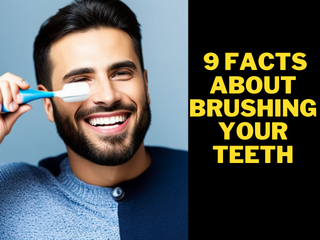 |
Here are 9 facts about brushing your teeth
Do you recall the first time that you were taught to brush
your teeth.
Although it seems simple, you will be surprised to learn
that many people make mistakes when brushing teeth.
Even more surprising is the thought of how people used to
clean their teeth back when toothbrushes didn't exist.
Here are 9 facts to help you ponder about brushing your
teeth.
It is dangerous to brush your teeth right after you eat.
Brushing your teeth immediately after eating can cause
damage to your tooth enamel.
Acidic foods such as pasta, meat, and fish can cause tooth
enamel to weaken.
After eating, dentists recommend that you wait at least 30
minutes before brushing.
This gives your tooth enamel enough time to harden once
again and prevents it from getting damaged.
The
toothbrush we use today was created in prison.
It is crazy to believe that toothbrushes were once part of
everyday life.
The most common method of cleaning your teeth was with a rug
and some soot.
William Addis was disgusted by this method of cleaning his
teeth. He made the first toothbrush in 1780 while being imprisoned for starting
a riot.
He did it by drilling holes in a cow bone for pig bristles.
He was released from prison and immediately set up a company
to produce his invention in mass production.
Rinsing
your mouth is more important than brushing your teeth.
Fluoride is an active ingredient in toothpaste that you
remove after brushing your teeth.
Your teeth can become more susceptible to decay and gum
disease once they are removed.
Fluoride can be removed even if you use mouthwash after
brushing your teeth.
Spitting is the best way to get rid of toothpaste excess
without removing the fluoride.
Rinsing with water should only be done after flossing, as it
ensures that any food particles are removed from your mouth.
Hard-bristled
toothbrushes are bad for your teeth.
Some consumers still buy hard-bristled toothbrushes because
they believe they are more effective at cleaning their teeth.
It is a myth to think that a hard-bristled toothbrush will
clean your teeth better.
It can cause bleeding and damage to your teeth enamel. This
is why dentists do not recommend it.
Instead, they recommend a soft-bristled toothbrush to remove
plaque from your teeth.
It can reach places on your teeth that a hard-brisled
toothbrush cannot.
Remember that a soft-bristled toothbrush can be more
damaging than a hard-bristled one.
Bad breath
can't be removed by simply brushing your teeth.
You don't have to brush your teeth every day; bad breath
will still be there if your tongue isn't cleaned regularly.
If your tongue appears yellowish or whitish, this is a sign
that you need to clean it.
The result of bacteria buildup on your tongue can lead to a
white, or yellow toe. This bacteria can eventually reach your teeth.
This makes brushing your smile less effective for protecting
your teeth from any oral health issues.
To clean your tongue with your toothbrush, you can use your
backside. However, a tongue scraper is more effective in removing bacteria and
preventing bad smells.
Toothpaste
can cause damage to your teeth.
Whitening toothpaste has more abrasive ingredients that
regular toothpaste.
You can make your teeth look slightly whiter by removing any
stains or extrinsic stains that are located on the outermost layer.
Examples of such stains are coffee and cigarettes.
However, whitening toothpaste can be dangerous because it
thins enamel and makes your teeth more sensitive.
Your
toothbrush is full of bacteria.
After brushing your teeth, bacteria from your mouth remains
on your toothbrush.
Although most bacteria found in it is harmless, some can
cause infection.
Some bacteria can still be found on toothbrushes even after
washing them with water. It is recommended that you replace your toothbrush
every other day.
A new toothbrush will not only remove plaque effectively,
but it is also less likely to harbor fungal or bacterial growth.
Also, it is better to not store your toothbrush in an
enclosed container. This can lead to moisture which can encourage bacteria
growth.
Poor oral
hygiene can lead to heart problems.
Poor oral hygiene and dental problems could lead to heart
problems, which you wouldn't think of.
A study showed that people who have poor oral hygiene and
gum disease are at greater risk for developing coronary heart disease.
Bleeding gums can cause bacterial infection in the
bloodstream. This can affect different parts of your body like your heart.
This can cause inflammation of the heart vessels, which in
turn can infect the valves.
To maintain healthy teeth and a healthy heart, it is
important to practice good oral hygiene.
Brushing
your teeth with toothpaste is acceptable.
Surprisingly toothbrushes can clean your teeth by
themselves. Just a simple brush motion will remove any plaque.
Dry brushing is even recommended by dentists because it
allows you to take your time brushing your teeth and removes more plaque.
Ideally, you should brush your teeth for 2 minutes
regardless of whether you use toothpaste.
You can remove a lot of plaque by brushing your teeth for
less than a minute.
Brushing for longer than 2 minutes can lead to gum receding
or enamel erosion.

.png)

.png)

0 Comments